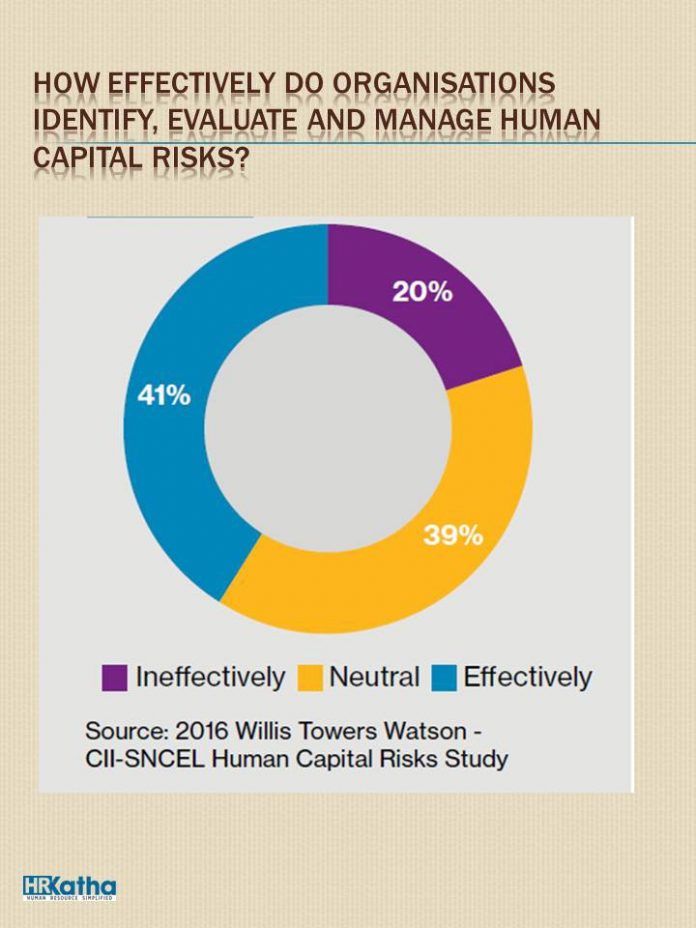‘State of Human Capital Risk in India’ study reveals that although 62 per cent companies in the country realise the urgency of HCR at the board level, only 33 per cent have a formally-defined risk mitigation or control strategy in place.
Human capital risks are rarely identified and managed in a systematic manner at the enterprise level in India. Even organisations that are aware of their vulnerabilities generally employ a narrow focus and fail to assess the entire gamut of risks.
According to a first of its kind study —State of Human Capital Risk in India— around 62 per cent Indian companies realise HCR to be an urgent board-level concern. Yet, only 33 per cent have a formally-defined risk mitigation or control strategy in place! This study by CII–Suresh Neotia Centre of Excellence for Leadership, in association with Willis Towers Watson, interviewed close to 100 CEOs, CHROs and other senior executives in India from a diverse set of industries.
While 61 per cent of the respondents from MNCs consider HCR as an important board-level concern, only 39 per cent of respondents from Indian companies voice a similar concern. This can be best understood in the context of the evolution of risk management in India, which is still a developing discipline.
This is because, Indian companies have enjoyed explosive growth, and bringing up risk is sometimes perceived as injecting a note of pessimism, and is therefore not entirely welcome. The study suggests that the reason behind such a mindset has more to do with perception than reality.

According to the study, a limited understanding around the issue of HCR, a lack of subject matter specialists and insufficient dialogue between the HR and risk management functions are the top barriers to effective HCR management.
This could be because these functions are separated by different reporting lines, and thus, have little incentive to collaborate. These functions also tend to attract employees with different skills and capabilities, which could inhibit collaboration. This is a bigger challenge for larger organisations than for smaller or even midsize ones.
However, there has been a marked improvement in the overall state of affairs over the years. The subject of ‘managing human capital risk’ rarely figured on the agenda of the Board and C-Suite leadership in Asia, and even less so in India, till a few years ago. The improvement lies in the fact that today a large number of organisations acknowledge the importance of this risk factor.
Several factors have contributed to this change. In today’s digital economy, innovation is driving businesses. This, in turn, is driven by human capital. Having high-calibre employees developing exceptional products or services makes the difference between success and failure.
“In the high-tech industry, some acquisitions are executed solely to capture the superstar employees of the acquired firm,” says Shatrunjay Krishna, director–rewards, talent and communication, Willis Towers Watson, India.

HCR can arise from a number of internal and external forces—uncertainties in the regulatory environment, demographic shifts, competitive landscape, interest rates and exchange rate fluctuations, changing consumer demands— and other factors that directly or indirectly impact businesses. Internal changes—new processes, operations, technology and service offerings, or expansion to different locations—can also give rise to HCR.
The fact is that organisations cannot afford to ignore risks with large-scale impact, such as a misalignment between culture and strategy, governance, manager ineffectiveness, employee disengagement, rising costs, and suboptimal use of HR technology and HR infrastructure. While HR might be primarily responsible for managing these risks, risk professionals and corporate boards also need to be involved to achieve optimal results.
An underlying finding of the study is that corporate leaders today realise that human capital can make or break the sustained viability and success of their businesses. Hence, they are more likely to make it a priority. Confirming that HCR management will grow in importance, the study finds that three out of four respondents plan to invest additional resources in HCR management over the next five years.
Value our content... contribute towards our growth. Even a small contribution a month would be of great help for us.
Since eight years, we have been serving the industry through daily news and stories. Our content is free for all and we plan to keep it that way.
Support HRKatha. Pay Here (All it takes is a minute)




































